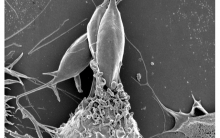A new study from McGill University shows that increases in the concentrations of blood sodium can have an influence on the biological clock of mice, opening new research avenues for potentially treating the negative effects associated with long distance travel or shift work.

Category:
Published on: 9 Jul 2020

Does the time of day matter when our body is infected by a parasite? According to new research from McGill University, it matters a great deal.
Category:
Published on: 8 Sep 2017
Does the biological clock in cancer cells influence tumour growth? Yes, according to a study conducted by Nicolas Cermakian, a professor in McGill University’s Department of Psychiatry.
Published in the journal BMC Biology, these results show for the first time that directly targeting the biological clock in a cancerous tumour has an impact on its development.
Category:
Published on: 16 Feb 2017

The brain’s biological clock stimulates thirst in the hours before sleep, according to a study published in the journal Nature by McGill University researchers.
Category:
Published on: 28 Sep 2016
